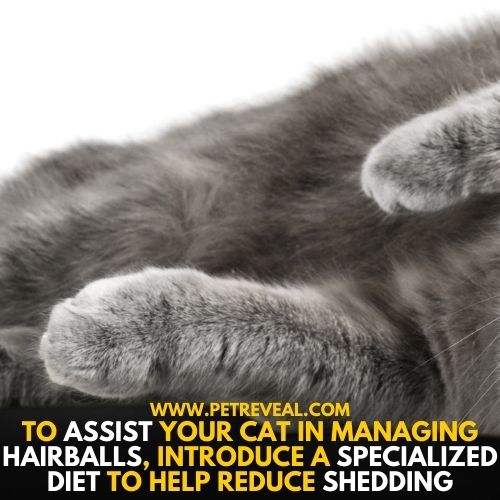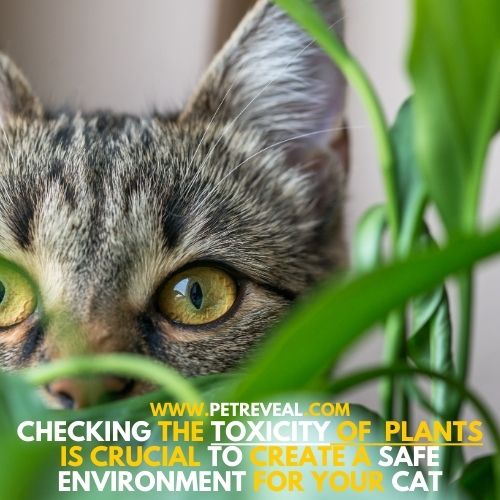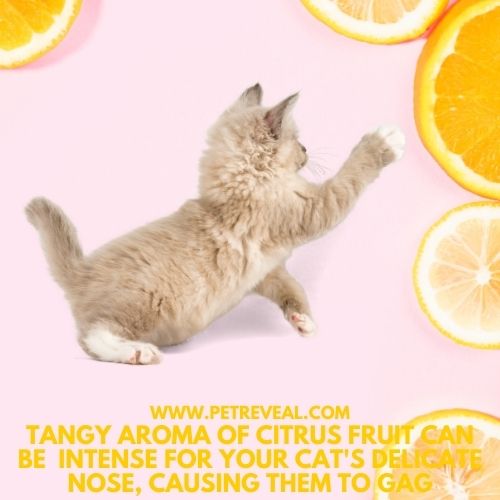Do you wonder what could make your cat gag at different objects? These seven objects would add to your information. From common culprits like hairballs to unexpected triggers such as citrus fruits, cats can have quite a sensitive response to certain stimuli.
Understanding these aversions can help create a more comfortable environment for your furry friend. But, what other five objects may elicit such a strong reaction from your cat? Stay tuned to uncover the full list of items that cats gag at.
Jump to a Specific Section
Seven Objects Cats Gag At
There can be several objects that make cats gag, here is a list of seven objects that affect cats. prevention is always better than cure, check the following list and manage a safe home for your feline companions.
Hairballs
If your feline friend coughs constantly coughing up hairballs, it’s important to understand why this occurs and how you can help alleviate it.

Hairballs are formed when your cat grooms itself, and loose hair is ingested. The rough texture of a cat’s tongue makes it easy for hair to accumulate in their stomach.
To assist your cat in managing hairballs, you can introduce a specialized diet that helps reduce shedding or incorporate hairball remedies like gels or treats.

Regular grooming sessions can also be beneficial in preventing excessive hair ingestion. By taking these steps, you can make your cat more comfortable and reduce the frequency of hairball-related incidents.

Precaution: Cats can even die from hairballs if they can’t pass them. It’s important to monitor your cat’s grooming habits and seek veterinary care if you notice any signs of distress.
Spicy food
The sensation of spices can be strong for cats’ sensitive taste buds they may gag or vomit due to the unpleasant taste and sensation it creates in their mouths. Cats’ heightened sensitivity to bitter flavors means that spicy foods can provoke both a sensation of heat and an aversion due to their bitterness.

Moreover, their digestive systems are not well-equipped to handle spicy foods, which can lead to gastrointestinal discomfort or even irritation.
Precaution: To prevent cats from encountering spicy foods, store them securely, educate household members, and offer safe treats. If ingestion occurs, seek veterinary advice promptly to ensure your cat’s well-being
Certain plants
Some plants, such as lilies, contain toxins harmful to cats if ingested. Even the scent of these plants can cause discomfort or gagging in sensitive cats. Keeping these plants out of reach ensures your feline friend stays safe and healthy.

Other plants toxic to cats include azaleas, lily of the valley, and oleander, which can induce gagging or more severe reactions if ingested or sniffed. Checking the toxicity of household plants is crucial to creating a safe environment for your furry companion
Precaution: Lilies, philodendron, pothos, sago palm, dieffenbachia, ivy, azalea, cyclamen, marijuana, and aloe vera can all be harmful to cats if ingested.
It’s important to research any plants in your home or garden to ensure they are safe for your cats and to contact your veterinarian immediately if you suspect your cat has ingested a toxic plant.
Bitter Medication
When administering bitter medication to your cat, consider mixing it with a small amount of their favorite food to help mask the taste. Cats are known for their discerning palates, making it challenging to give them bitter medication.
You can combine the medicine with a tasty treat to increase the chances of your cat consuming it without issue. Some options to mix the medication include wet food, tuna juice, or a small amount of chicken broth.

However, ensure your cat eats the entire portion to guarantee they receive the full medicine dosage. This simple trick can make the process smoother for you and your feline friend when administering bitter medication.
Precaution: Always administer the correct dosage and ensure that your cat consumes the full course of treatment. Don’t forget to monitor your cat for adverse reactions or side effects. Contact your vet immediately for guidance and support, if you find some strange behavior or reaction in your cat.
Strong Perfumes
To prevent overwhelming your cat, consider avoiding strong perfumes in areas where they spend a lot of time. Cats have a strong sense of smell, and strong perfumes can be unbearable. These scents can cause discomfort, leading to gagging or even respiratory issues in some cats.
Cats may exhibit signs of distress, such as sneezing, coughing, or trying to escape the strong scent. Opt for milder fragrances or natural scents, less likely to irritate your feline friend. By being mindful of the perfumes you use around your cat, you can create a more comfortable and pleasant environment for them to thrive in.
Citrus Fruits
Consider that just as strong perfumes can overwhelm your cat’s sensitive sense of smell, certain citrus fruits may elicit a similar reaction from your feline companion. Cats often find the scent of citrus fruits like oranges, lemons, and grapefruits repulsive.

The strong, tangy aroma of citrus fruits can be too intense for your cat’s delicate nose, causing them to gag or even avoid areas where citrus scents are prevalent. It’s important to be mindful of this aversion when using citrus-scented products in your home or offering citrus fruits as treats.
While some cats may not be bothered by citrus scents, many will likely turn up their noses at these vibrant fruits.
Precaution: Citrus fruits may be toxic to cats due to compounds like limonene and citric acid. These can cause stomach upset, diarrhea, or even more severe issues. Keep citrus away from your feline friend’s reach.
Cleaning Products
Using cleaning products around your cat requires caution and awareness of their potential effects on your feline friend. Cats are usually sensitive to many chemicals found in common household cleaners. Ingredients like bleach, ammonia, and phenols can be toxic to cats if ingested or even just inhaled.
When using cleaning products, ensure your cat is in a well-ventilated area or temporarily relocate them to a safe space. Always read labels carefully, opting for pet-safe or natural alternatives whenever possible. Keep cleaning products securely stored and never leave them unattended where your curious cat might investigate.
Resources
https://www.researchgate.net/publication/342624120_Taste_preferences_and_diet_palatability_in_cats